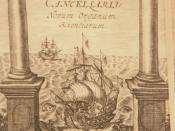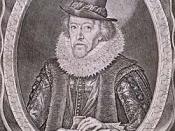Francis Bacon and Rene Descartes blazoned the advent of a scientific civilization. Both men ridiculed earlier methods of seeking knowledge, that were once used in the academic traditions of the universities founded in the Middle Ages. Both men published between 1620 and 1640 and held to the belief that Medieval or Aristotelian methods were retrograding and worthless. Through their works they stressed that truth was something we find at the end, after a long process of investigation, experiment, or intermediate thought. Although their programs differed they both became pioneers in the field of scientific knowledge.
Francis Bacon called for a complete new start in science and civilization. Through his Instauratio Magna or "Great Renewal" he achieved his goal. He only completed two parts of his Instauratio Magna. In 1620, the Novum Organum or new method of aquiring knowledge was published. Bacon insisted on using a correct scientific method building on inductive reasoning.
In the inductive method we proceed from the particular to the general, from the concrete to the abstract. Carefully organized systematic experiments with thorough observations would bring about correct generalizations. Bacon advised his readers to put aside all the traditional ideas and look at the world with fresh eyes. By doing so, his philosophy professed a useful way of avoiding seeing the world in a preconceived manner. Out thoughts would be guided by the facts as we actually observed them. In The Advancement of Learning, published in 1623 Bacon insisted that true knowledge was useful knowledge. In The Atlantis (1627) he portrayed a scientific utopia whose inhabitants enjoyed a perfect society through their knowledge and command of nature. The fact that knowledge could be used for practical purposes became a sign or proof that it was true knowledge. Baconians believed knowledge was power. Scientific knowledge though, could...


